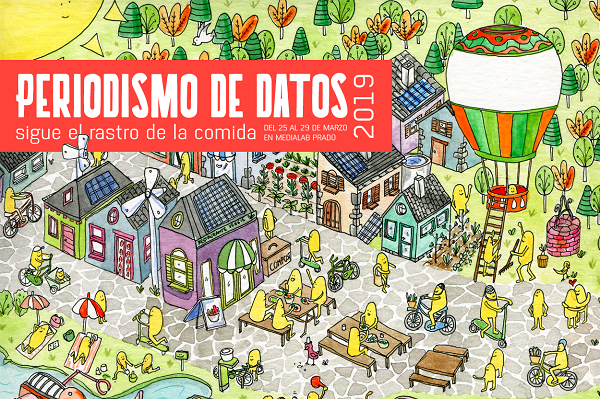
The Data Journalism Workshop 2019 is already underway. It will be held from March 25 to 29 at Medialab Prado (Calle Alameda 15, Madrid). Under the motto "Follow the food", this year's edition will focus on the world of food, with reference to the Sustainable Development Goals (SDG).
The objective is that participants " analyse, narrate or redesign, in a creative and radical way, changes in the food models that can serve to reduce the likelihood of environmental collapse." For this purpose, they will have to search and analyze public data from different sources, as well as reuse data to create new visualizations or applications.
Among all the ideas presented in the call for projects, 7 have been selected. Collaborators who want to develop these projects are now sought. To this end, a call for collaborators has been launched, aimed at any citizen who wants to be involved in the development of a project based on data: from professionals in the field of journalism, programming, sociology or design, to students or pensioners. It should be noted that Medialab-Prado offers 20 free accommodation places for those who sign up for the call and do not live in Madrid.
Participants can sign up to the following projects:
- School feeding in Spain. Project promoted by Del Campo al Cole entity, which seeks to promote healthy and sustainable nutrition in schools in Madrid. In collaboration with other organizations such as Carro de Combate and SEO / BirdLife, they have compiled a large amount of data about this subject, as the result of requests for public information to Autonomous Communities and the Ministry of Education. Now they are looking for help to interpret and visualize these data in a simple way, in order to facilitate their dissemination and create awareness about the reality of school feeding in Spain, taking into account the different aspects (public purchase, catering companies, environmental impact, social inequalities ...).
- Food ultraprocessing: the hidden truth. This project seeks to disseminate the NOVA classification system, which classifies food according to its level of processing. Taking the example of Mexico, an interactive map will be developed to help understand the relationship between habits and dietary choices, as well as their repercussions on the environment by analyzing energy consumption and waste generation associated with each type of food.
- Intesive livestock farming = extensive problems. This project seeks to create awareness of the problems arising from intensive livestock farming. With a holistic and global vision, the dimension of the problem will be investigated in the whole chain of production: from animal husbandry to final consumption. Some of the questions the participants will have to answer are: how many animals do we sacrifice? Is the way we feed them sustainable and healthy? How do exports and imports work? Do we eat everything we produce?
- Undressing foods. Through the mapping and artistic visualization of the route that the food takes from the place of production to the final point of consumption, this project seeks to stimulate responsible consumption habits. The final result of the project will be a technological tool that allows the user to locate the origin of a product, using information about the route taken, the environmental impact generated (CO2, especially) and the aesthetic impact that this route could generate in the product.
- Food in km. The objective of this project is to create a tool that facilitates the search for information about products on the market, to promote responsible consumption. The tool will allow ordering the results depending on the distance between the origin of the food and the province where it is going to be consumed, as well as filtering products according to labels - bio or not - and ingredients - those ingredients involved in environmental conflicts or restrictive in certain diets.
- The oil we eat. This project seeks to analyze how the import of agri-food products has evolved in recent years, and calculate how much oil has been consumed to bring a certain food to our table. The participants in this project will create a website and a recipe book whiout cooking time, calories or nutritional contribution. Instead, it will talk about oil costs. Later, maybe it is possible to carry out a transmedia work, involving several platforms, promoting citizen participation using gamification.
- From the seed to your plate. This project is the continuation of the work started in the Visualizar'18 data visualization workshop. Migrations: Soy de temporada. Now their creators look to deepen the environmental and economic costs of consuming products exported from faraway places. To this end, the entire production line of maximum four products will be analysed, comparing their implications: two vegetables and two fruits, one fromlocal production and one from global trade,
In addition, during the workshop, participants can also participate in a series of training workshops, such as Blockchain's Introduction to journalism or PLN with Python NLTK.
If you are interested in telling stories based on data, sign up before March 16th.
Me interesa el proyecto pero me es imposible asistir , ¿ lo puedo seguir por twiter?
Buenos días Ana María,
El evento se podrá seguir en redes sociales con los hashtags #followhefood y #tdp19.
Un cordial saludo.